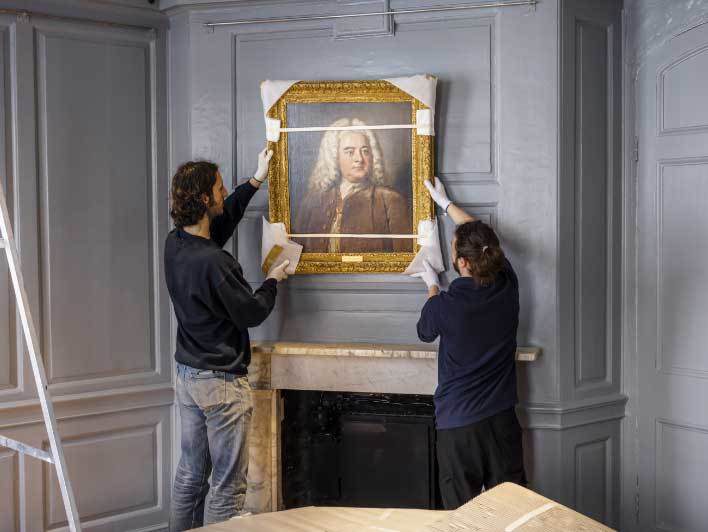LOTARIO (HWV 26)
Libretto: Giacomo Rossi, after Antonio Salvi
First performance: 2nd December 1729, King's Theatre, London
Cast
- Anna Maria Strada del Pò (Soprano)
- Antonio Maria Bernacchi (Alto-castrato)
- Annibale Pio Fabri, called "Balino" (Tenor)
- Antonia Maria Merighi (Contralto)
- Francesca Bertolli (Contralto)
- Johann Gottfried Riemschneider (Bass)

Synopsis
Act I
Prior to the action of the opera, Berengario, Duke of Spoleto, has ruled a divided Italy with Lotario, son of the Count of Arles. But Berengario grew ambitious and had Lotario poisoned, offering his own son Idelberto in marriage to Lotario’s widow, Adelaide. She refused the offer, and now reigns in her dead husband’s place from his court in Pavia.
At the start of the opera, Berengario bemoans the fate of the ambitious ruler. Clodomiro, his general, arrives to tell him that the German king, also called Lotario, is marching his troops into Italy. Berengario dispatches Clodomiro to rouse his son to arms to capture Pavia before Lotario and his troops arrive. Matilde, Berengario’s equally ambitious wife, enters to tell him that she has bribed the citizens of Pavia to open the city gates to his troops. Idelberto, their son, is horrified by this unchivalrous act, and begs his father to spare Adelaide who he genuinely loves. Berenagrio promises to act honourably. Idelberto asks his mother, too, to be merciful to Adelaide. But she is implacable and tells her son to convince Adelaide to marry him, or she will die.
In her throne room in Pavia, Adelaide contemplates her desire for revenge. She admits Lotario, the German king, to her presence. He reveals that he has loved her for many years, and has arrived now to offer his support to her. She accepts his offer, and promises him anything he demands if he is successful. Clodomiro now enters and repeats Berengario’s offer of his son in marriage. Adelaide once more refuses.
Lotario now returns and tells Adelaide of the treachery of her people – they have opened the city gates to admit Berengario and his troops. Distraught, Adelaide begs to be left alone, but Lotario wants to stay and die with her. Adelaide tells him that if he truly loves her he will fight to save her. She promises her heart if he returns in triumph, and he goes off to fight in her name.
Berengario enters the city in triumph, but is confronted by a haughty Adelaide. She once again refuses his offer of Idelberto in marriage. Clodomiro arrives with the news that Lotario’s troops are at hand, so Berengario leaves Adelaide a captive to Matilde while he goes to confront the German king. Matilde drags Adelaide off to prison in chains.

Act II
Berengario’s troops have been routed and he flees the battlefield. He resolves to die like a king, but is captured by Lotario. Handing over his sword, Berengario surrenders to fate. As Berengario is taken to prison, Lotario contemplates his own surrender to love.
Adelaide is in prison, preparing herself for death and a reunion with her husband. Clodomiro enters with two basins – one containing poison and a dagger, and the other a crown and sceptre. When forced to chose between them, Adelaide decides that death is preferable to marriage with her enemy, and choses the poison and dagger. Determined to die in the same way as her husband, she reaches for the poison as Matilde enters. As she is about to drink, encouraged by Matilde, Idelberto overcomes the guards and bursts in. Matilde is furious and reminds Idelberto that he is her subject as well as her son. Grabbing the dagger and bearing his breast, he begs his mother to kill him for he cannot live without Adelaide. She refuses and urges Adelaide on. As she lifts the cup again to her lips, Idelberto holds the knife to his own breast and threatens to kill himself. Finally moved by her son, Matilde dashes the cup and dagger from their hands.
Clodomiro enters with news of Berengario’s defeat and disappearance. Matilde orders him to summon the Senate, and leaves Adelaide and Idelberto alone with her curse. Adelaide tells Idelberto of her gratitude for saving her life, but tells him she can never love him. Idelberto tells her that he is content to worship her from afar. Left alone in her cell, Adelaide thanks the gods for the two protectors that have saved her – Lotario and Idelberto.
Outside the city of Pavia, where his troops are encamped, Lotario calls to Matilde to appear. She does so on the city walls, and is offended by Lotario’s insults. She brings Adelaide out and threatens to kill her if Lotario does not withdraw. Lotario sends for Berengario, threatening to kill him if Matilde hurts Adelaide. Now Idelberto arrives and offers to die in Matilde’s place, offering himself as a prisoner to Lotario. Matilde hesitates, then returns Adelaide to her cell. Lotario releases Berengario and sends him to his wife, with demands for the release of Adelaide. If this is not agreed, Idelberto will die. Lotario sends Idelberto to captivity as he prepares to storm the walls of Pavia.

Act III
Matilde and Berengario try to persuade Adelaide to write to Lotario, and to use her influence over him to promise them their throne again. Adelaide refuses, and returns to prison. Matilde and Berengario agree to continue the fight against Lotario, though Berengario is concerned about his son’s fate. Matilde, left alone, continues to hope that her luck will change.
Lotario once more has Berengario in chains, and launches his assault. The walls of Pavia are breached, and he is horrified to see Clodomiro guarding Adelaide in the front line of Matilde’s troops. He orders his troops to cease the assault, and raises the white ensign of surrender. Once more he threatens to kill Idelberto and Berengario if Adelaide is not removed from the battlefield. Idelberto is sent into the breach to remove Adelaide, and Berengario is returned to captivity.
Clodomiro realises that Matilde will soon join Berengario in chains. Lotario receives a letter of surrender from the people of Pavia, and prepares to rescue his beloved Adelaide.
In the throne room, Idelberto discovers his mother with drawn sword preparing to take Adelaide’s place on the battlefield. Idelberto begs her as his mother to desist, but she disowns him, calls him a coward, and says she will show him that she has a dauntless and heroic soul. As she leaves she is met by Clodomiro, who tells her that she is too late, and that Pavia has surrendered to Lotario. Blaming her son for this disaster, she demands that Adelaide is brought before her so that she can kill her before Lotario arrives. But Idelberto tells her that he has already released Adelaide, and she turns her sword on him. If he has truly committed a crime, Idelberto tells her, then he deserves to die at her hand. Torn between vengeance and her maternal instinct, Matilde hesitates.
Lotario storms in and orders Matilde to be chained. But the queen refuses to surrender and tries to kill herself with her sword. But Berengario enters and begs her to submit, and finally she lets her sword drop and is put in chains with her husband.
Lotario agrees to Adelaide’s request to decide the fate of the captives. She agrees to marry Lotario and, in thanks for saving her life, raises Idelberto to his father’s throne. She joins Lotario in a duet celebrating their love, and all join in a final chorus of praise to their love and the valour of just rulers.
Context
The plot of this opera may well have confused those in the audience who were familiar with the historic events on which it is based. Although historical veracity was never the strong point of opera seria libretti, Handel’s choice of names for his characters must have left many perplexed. In fact, the Lotario of the title was none other than the King Otho of Germany whom Handel had already portrayed in his 1723 opera Ottone. Indeed the events of that previous success happen after the events in his new opera making it virtually a prequel. The Adelberto and Gismonda of Ottone are the same characters as Idelberto and Matilde in Lotario – the weak son’s domination by his scheming mother is apparent in both. Indeed, Handel had stuck with the name Ottone in the autograph score of Lotario until some 66 pages into the composition, when suddenly he changed it to Lotario. This confused matters even more since Adelaide’s murdered husband was also called Lotario!
Handel’s first opera for what has become known as the ‘Second Royal Academy’ introduced a new group of singers to the London audience. He was now in business with Heidegger, the manager of the King’s Theatre, and bearing the brunt of the financial burden of performances himself. It is perhaps best left to the observations of Handel’s contemporaries to assess the success of his new venture, and his new singers:
Mrs. Pendarves to her sister, 29th November 1729: ‘Bernachi has a vast compass, his voice mellow and clear, but not so sweet as Senesino, his manner better; his person not so good, for he is as big as a Spanish friar. Fabri has a tenor voice, sweet, clear and firm, but not strong enough, I doubt, for the stage; he sings like a gentleman, without making faces, and his manner is particularly agreeable; he is the greatest master of musick that ever sang on the stage. The third is the bass, a very good distinct voice, without any harshness. La Strada is the first woman; her voice is without exception fine, her manner perfection, but her person very bad, and she makes frightful mouths. La Merighi is next to her; her voice is not extraordinarily good or bad, she is tall and has a very graceful person, with a tolerable face; she seems to be a woman about forty, she sings easily and agreeably. The last is Bertoli, she has neither voice, ear, nor manner to recommend her; but she is a perfect beauty, quite a Cleopatra, that sort of complexion with regular features, fine teeth, and when she sings has a smile about her mouth which is extreme pretty, and I believe has practised to sing before a glass, for she has never any distortion in her face.’
Paolo Rolli to his friend Giuseppe Riva, 11th December 1729: ‘Nine days ago the opera Lotario was produced. I went only last Tuesday, that is to the third performance. Everyone considers it a very bad opera. Bernacchi failed to please on the first night, but at the second performance he changed his method and scored a success…Strada pleases mightily, and (Handel) says that she sings better than the two who have left us, because one of them never pleased him at all and he would like to forget the other…Fabri is a great success. He really sings very well. Would you have believed that a tenor could have such a triumph here in England?…They are putting on Giulio Cesare because the audiences are falling away fast. I think the storm is about to break on the head of our proud Orso (Handel). Not all beans are for market, especially beans so badly cooked as this first basketful…’
Mrs. Pendarves to her sister, 20th December 1729: ‘The opera is too good for the vile taste of the town; it (Lotario) is condemned never more to appear on the stage after this night…The present opera is disliked because it is too much studied, and they love nothing but minuets and ballads, in short the Beggars’ Opera and Hurlothrumbo are only worthy of applause.’
Mrs. Pendarves was right. After only 10 performances Lotario was taken off, and had to wait another 245 years for a revival. Handel’s new operatic venture had not got off to a very propitious start.


